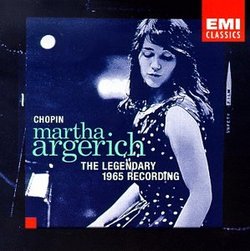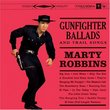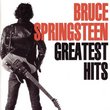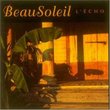| All Artists: Martha Argerich Title: Martha Argerich Plays Chopin: The Legendary 1965 Recording Members Wishing: 1 Total Copies: 1 Label: EMI Classics Original Release Date: 1/1/1965 Re-Release Date: 5/18/1999 Genres: Dance & Electronic, Classical Styles: Chamber Music, Forms & Genres, Sonatas, Historical Periods, Classical (c.1770-1830), Romantic (c.1820-1910) Number of Discs: 1 SwapaCD Credits: 1 UPCs: 724355680525, 724355680556 |
Search - Martha Argerich :: Martha Argerich Plays Chopin: The Legendary 1965 Recording
 | Martha Argerich Martha Argerich Plays Chopin: The Legendary 1965 Recording Genres: Dance & Electronic, Classical
Record-label politics prevented this awesome recording of Argentinean pianist Martha Argerich from being released for 34 years. The spitfire musician delivers a powerful set of Chopin's best-loved works that still sounds r... more » ![header=[] body=[This CD is available to be requested as disc only.]](/images/attributes/disc.png?v=15401716) ![header=[] body=[This CD is unavailable to be requested with the disc and back insert at this time.]](/images/attributes/greyed_disc_back.png?v=15401716) ![header=[] body=[This CD is unavailable to be requested with the disc and front insert at this time.]](/images/attributes/greyed_disc_front.png?v=15401716) ![header=[] body=[This CD is unavailable to be requested with the disc, front and back inserts at this time.]](/images/attributes/greyed_disc_front_back.png?v=15401716) |
Larger Image |
CD DetailsSynopsis
Amazon.com's Best of 1999 Record-label politics prevented this awesome recording of Argentinean pianist Martha Argerich from being released for 34 years. The spitfire musician delivers a powerful set of Chopin's best-loved works that still sounds riveting today. Intense and gorgeous. --Jason Verlinde Similarly Requested CDs
|
CD ReviewsBrilliant but is it still Chopin? F. Behrens | Keene, NH USA | 10/07/1999 (5 out of 5 stars) "Every word praise of Argerich's playing on this website is certainly heartfelt and true. Of the pianist's genius there is no disputing. But whether she is doing justice to Chopin is perhaps another matter.I am reminded of some tenors in opera who approach every bar of music with whitehot intensity, even where the situation (and the composer's markings) call for gentleness. In a more recent recording, Argerich keeps the conductor hard pressed to follow her tempi, making the work her show entirely and not a concerto in the strict sense of the word.So here on this EMI recording we have the music brilliantly played--and this is one CD I plan to keep in my collection--but (and I ask this hestitatingly and humbly) is this Chopin being played by Argerich or Argerich playing Chopin? Thomas May's comments above go quite some way in answering this question; but we are not dealing with concrete, only abstract, nouns here.Another analogy might be all those Ella Fitzgerald sets of Gershwin, Kern, et alia. Certainly here we have these composers deconstructed and recreated to fit the singer's brand of performance. Well, Gershwin survives, Kern does not, Berlin does, and so on. So again I have to wonder if these highly idiosyncratic playings are true to the composer (whatever that might mean).On the other hand, great music exists objectively only as notes on lines on paper. Perhaps Chopin never had this kind of playing mind but certainly would accept it. That must remain forever a moot point. Still 5 stars to CD." Rivets the soul! Michael Newberry | Santa Monica | 03/27/2000 (5 out of 5 stars) "I have never been quite happy with pianists; it seems I should love much of the piano repertoire from Bach through Ravel and Rachmaninov. I have some things from Horowitz, Rubinstein, Ax, and Van Cliburn, but they don't give me feeling the excitement the music seems to promise. Last year I got this Argerich recording (thanks to Amazon's audio abilities). Now this is a great pianist...what a sound, what passion, how lyric, dynamic...and there is movement, tension that drives the music-something similar to Toscanini. Emotionally the playing is smoldering; at times blazing, and at other times so delicate and meaningful you could cry. And it all seems so natural, so right. I have gone on to buy many of her other recordings-and they all bring me tremendous satisfaction. In fact Argerich has inspired me to go and listen to other pianists with a renewed interest to hear their interpretations. But for me she plays on a level above the rest." A restored jewel in the Argerich catalog Santa Fe Listener | Santa Fe, NM USA | 09/03/2006 (5 out of 5 stars) "If I had to pick a single CD to win awed admiration for Martha Argerich, this Chopin recital would be it. Only 24 when she made these long-suppressed recordings, Argerich's musicality and dazzling technqiue defy belief. Every ounce of praise for her Third Sonata is deserved--it's spontaneous, flexible, intense, by turns tender and declamatory. The most blessed quality is that she doesn't bang or harangue us--not always the case in later years. Her sense of urgency doesn't become eckless; the bursts of excitment aren't oerly explosive.
My only caveat would be for audiophiles. Although an Abbey Road studio recording, you get the feeling somewhat that Argerich is performing in a boomy hall. Also, in the loudest fortes there's mircophone shatter. For many listeners these drawbacks won't matter a whit, not in the face of an undisputed keyboard genius. " |

 Track Listings (10) - Disc #1
Track Listings (10) - Disc #1








